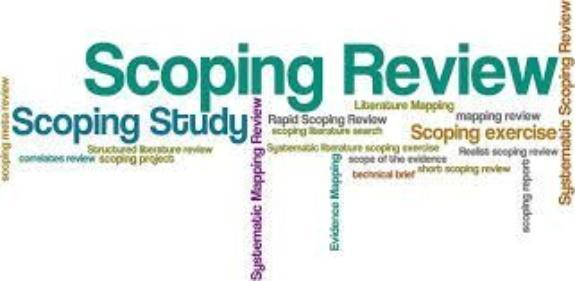Scoping Reviews: (Some of) The Basics

This research guide is intended to present useful resources (websites, online tutorials, training videos, key writings) on various aspects of conducting a scoping review, a type of knowledge synthesis among others (systematic reviews, network meta-analyses, overviews of reviews, rapid reviews, diagnostic reviews, prognostic reviews, and economic reviews) associated primarily with evidence-based health/biomedicine fields, though increasingly employed in other disciplines.
Definitions of scoping reviews
“True to their name, scoping reviews are an ideal tool to determine the scope or coverage of a body of literature on a given topic and give clear indication of the volume of literature and studies available as well as an overview (broad or detailed) of its focus. Scoping reviews are useful for examining emerging evidence when it is still unclear what other, more specific questions can be posed and valuably addressed by a more precise systematic review. They can report on the types of evidence that address and inform practice in the field and the way the research has been conducted.” (Munn et al., 2018).
[Scoping reviews are] "exploratory projects that systematically map the literature available on a topic, identifying key concepts, theories, sources of evidence and gaps in the research.”
(From Scoping reviews: what they are and how you can do them, Andrea C. Tricco, 2017) (see below under Useful training videos)
"Scoping reviews are used to identify knowledge gaps, set research agendas, and identify implications for decision-making." (Tricco et al., 2016)
Useful websites
Temple University Libraries Systematic Reviews & Other Review Types LibGuide:
"Scoping reviews have great utility for synthesizing research evidence and are often used to [categorize or group] existing literature in a given field in terms of its nature, features, and volume."
According to Grant and Booth (2009), a scoping review is a "preliminary assessment of potential size and scope of available research literature. Aims to identify nature and extent of research evidence (usually including ongoing research)."
Scoping Reviews are best designed for these purposes:
- "When a body of literature has not yet been comprehensively reviewed, or exhibits a large, complex, or heterogeneous nature not amenable to a more precise systematic review."
- [To] label body of literature with relevance to time, location (e.g. country or context), source (e.g. peer-reviewed or grey literature), and origin (e.g. healthcare discipline or academic field)
- [To] clarify working definitions and conceptual boundaries of a topic or field
- [To] identify gaps in existing literature/research"
PRISMA (Preferred Reporting Items for Systematic Reviews and Meta-Analyses)
PRISMA for Scoping Reviews (Tricco et al., 2018) (see below)
Useful training videos
Webinar: Scoping Reviews and How You Can Do Them (Andrea Tricco, August 2017)
Webinar: How to Conduct and Report Your Scoping Review: Latest Guidance (Andrea Tricco, July 2020)
Databases Typically Searched
- PubMed (CU)
- CINAHL (Cumulative Index to Nursing and Allied Health Literature) Plus with Full Text
- Embase (CU)
- PsycINFO (CU)
- Web of Science (CU)
- Scopus (CU)
Sample scoping reviews (non-medical/health fields)
- Algayres, M., & Triantafyllou, E. (2020). Learning Analytics in Flipped Classrooms: A Scoping Review. Electronic Journal of E-Learning, 18(5), 397–409. https://doi.org/10.34190/JEL.18.5.003
Identifying relevant studies: "Arksey and O’Malley suggest that a wide definition for search terms should be used. Therefore, we opted for a large selection of related terms, which covered various forms of LA. The following research string was thus devised: (("flipped classroom" ) AND (("learning analytics") OR ("engagement data") OR ("educational data" ) OR ("activity data" ) OR ("data mining")). The selection was then restricted to research that specifically used LA in the FC. The selected databases for this study were Scopus, Proquest, Web of Science, and JSTOR. Only peer-reviewed articles and papers, accessible in English, were selected. The research was carried for the period 2009-2019, a decade, which coincides with the exponential development of the FC."
- Krishnaratne S, Pfadenhauer LM, Coenen M, Geffert K, Jung-Sievers C, Klinger C, Kratzer S, Littlecott H, Movsisyan A, Rabe JE, Rehfuess E, Sell K, Strahwald B, Stratil JM, Voss S, Wabnitz K, Burns J. Measures implemented in the school setting to contain the COVID‐19 pandemic: a rapid scoping review. Cochrane Database of Systematic Reviews 2020, Issue 12. Art. No.: CD013812. DOI: 10.1002/14651858.CD013812.
Key writings on scoping reviews
Arksey H, O’Malley L. Scoping studies: Towards a Methodological Framework. Int J Soc Res Methodol. 2005;8(1):19–32.
Grant MJ, Booth A. A typology of reviews: an analysis of 14 review types and associated methodologies. Health Info Libr J. 2009 Jun;26(2):91-108. https://doi.org/10.1111/j.1471-1842.2009.00848.x. PMID: 19490148.
Levac, D., Colquhoun, H. & O'Brien, K.K. Scoping studies: advancing the methodology. Implementation Sci 5, 69 (2010). https://doi.org/10.1186/1748-5908-5-69
Morris, M., Boruff, J. T., & Gore, G. C. (2016). Scoping reviews: establishing the role of the librarian. Journal of the Medical Library Association : JMLA, 104(4), 346–354. https://doi.org/10.3163/1536-5050.104.4.020
Munn, Z., Peters, M.D.J., Stern, C. et al. Systematic review or scoping review? Guidance for authors when choosing between a systematic or scoping review approach. BMC Med Res Methodol 18, 143 (2018). https://doi.org/10.1186/s12874-018-0611-x
O’Brien, K.K., Colquhoun, H., Levac, D. et al. Advancing scoping study methodology: a web-based survey and consultation of perceptions on terminology, definition and methodological steps. BMC Health Serv Res 16, 305 (2016). https://doi.org/10.1186/s12913-016-1579-z
Tricco, A.C., Lillie, E., Zarin, W. et al. A scoping review on the conduct and reporting of scoping reviews. BMC Med Res Methodol 16, 15 (2016). https://doi.org/10.1186/s12874-016-0116-4
Tricco, AC, Lillie, E, Zarin, W, O'Brien, KK, Colquhoun, H, Levac, D, Moher, D, Peters, MD, Horsley, T, Weeks, L, Hempel, S et al. PRISMA extension for scoping reviews (PRISMA-ScR): checklist and explanation. Ann Intern Med. 2018,169(7):467-473. https://doi.org/10.7326/M18-0850
*******************************************************
Image: Word cloud from Tricco et al., 2016).

